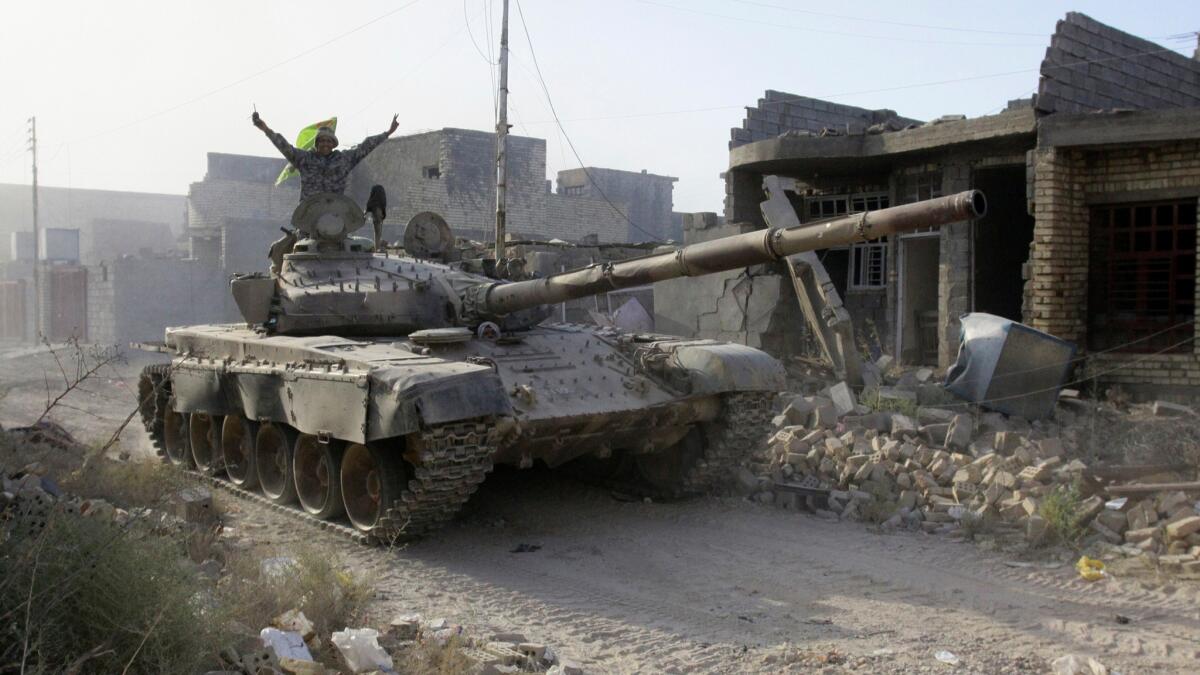Iraqi prime minister says Fallouja retaken from Islamic State extremists

Iraqi forces Friday recaptured the strategic city of Fallouja from Islamic State after more than two years, a key victory for the government and a U.S.-led coalition eager to remove the extremist group from power.
Thousands of civilians who had been trapped in the city fled in search of safer surroundings, food and water as pro-government forces moved in to clear out Islamic State, Iraqi and humanitarian aid officials said.
Officals said brigades from three Iraqi army divisions, federal police and tribal fighters encircled the city before counter-terrorism forces fought their way in, cleared it of fighters and ultimately raised the Iraqi flag over the city’s main government building. The forces were backed by U.S.-led coalition warplanes, which conducted strikes on Friday and have provided more than 85 airstrikes in the last four weeks in Fallouja in support of a government offensive.
By late Friday, Iraqi Prime Minister Haidar Abadi had declared the military push a de-facto victory for the government.
“Fallouja returned to the bosom of the nation,” Abadi said in a televised address. “Our forces control the district of Fallouja and have secured their control inside the city.”
See more of our top stories on Facebook »
The city, which fell to Islamic State in January 2014, has been a hotbed of Sunni extremism for years and may be best remembered as the place where a mob in 2004 killed and mutilated the bodies of four workers with a private company, Blackwater, contracting with the U.S. military.
Fallouja’s fall to Islamic State came only months before the Iraqi army collapse that resulted in the group’s control of several cities, including Mosul, which remains its stronghold in Iraq about 250 miles north.
The loss of Fallouja, as the government presses a major offensive across key parts of the country aided by airstrikes from the U.S.-led coaltion, is considered a significant blow to Islamic State. The city’s closeness to Baghdad, which is about 35 miles to the east, has made it an effective place for militants to prepare attacks on the capital.
Fallouja was known for antigovernment feelings during the sectarian violence that came with the U.S. invasion of Iraq in 2003, which overthrew the Sunni-dominated government of Saddam Hussein.
Abadi, who Friday said “there are still some areas which require cleansing in the coming hours,” also insisted that there would be peace and security in the city despite fears of sectarian-fueled reprisal attacks by pro-government forces against city residents.
“This is your city and you will return to it safe and sound,” he said.
The offensive on Fallouja that began late last month came as Islamic State, which adheres to a harsh interpretation of Sunni Islamic law, branding Shiites as well as other religious groups as apostates or infidels who must be killed, has suffered setbacks throughout its self-proclaimed caliphate. Over the last week, various forces arrayed against the group have taken control of the Libyan port city of Sirte, and are poised to take the strategic town of Manbij in northern Syria.
The apparent success in Fallouja seemed to have emboldened the government to refocus on launching its long-delayed assault toward Mosul.
“We are determined to liberate Mosul and expel the last remnants of #daesh from #Iraq in 2016,” Abadi tweeted. He referred to Islamic State by its Arabic acronym, which is considered to be a pejorative by the group’s members.
Capturing Mosul, a city of more than 1 million, also has been a goal of U.S. commanders and White House officials. Taking back the city would deal a decisive blow to the militants before President Obama leaves office in January.
Colonel Christopher Garver, spokesman for the U.S.-led coalition in Baghdad, said a lot of work remained to be done in Fallouja, as fleeing militants have rigged houses and streets with bombs much as they have with other cities they abandoned in the past.
U.S. Defense Secretary Ashton Carter told reporters at the Pentagon that the retaking of Fallouja was an important objective.
“And it’s important that it was accomplished by the Iraqi security forces under the command of Prime Minister Abadi, because that’s an important principle for us: For Iraq to put itself back together as a whole in the long run,” Carter said.
NEWSLETTER: Get the day’s top headlines from Times Editor Davan Maharaj »
Friday’s breakthrough followed weeks of slow progress by Iraqi troops, whose advance was blunted by Islamic State’s signature tactics of booby-traps and snipers.
Yet activists in contact with Fallouja residents said that much of Islamic State’s cadres had withdrawn before Friday’s battle.
“Only a few foot-soldiers remained behind and they were killed,” said the administrator of “We are all Fallouja,” a community page on Facebook.
Known as “the city of mosques,” Fallouja once had 300,000 residents; aid groups estimated that until recently roughly 50,000 people had remained in the city.
Tens of thousands of civilians have evacuated the city in recent weeks, according to the United Nations, via safe corridors established by government forces and Shiite irregular units known collectively as the Popular Mobilization Forces.
Those fleeing the city also spoke of a retreat by the extremists, said Karl Schembri, Regional Media Advisor for the Norwegian Refugee Council.
“The displaced people we’ve spoken to said that yesterday, early morning, they noticed that the ISIS fighters were withdrawing from key checkpoints around the city,” said Schembri in a phone interview from Baghdad on Friday.
Their withdrawal, he said, emboldened thousands of civilians to flee Fallouja and risk being killed by explosive devices left behind by the extremist group.
“Between yesterday and today, an estimated 20,000 people have left,” Schembri said. “It’s a tidal wave of the displaced coming to the camps.”
But the new influx of refugees has threatened to overwhelm assistance efforts.
“There are thousands stranded without tents, and they are sleeping in the middle of nowhere. We’re waiting for new stocks of tent, and we need to open new camps,” Schembri said. “It’s a totally chaotic situation.”
Special correspondent Bulos reported from Beirut and Times staff writer Hennigan from Washington.
UPDATES:
3:08 p.m.: This article has been updated with staff reporting.
11:16 a.m.: This article has been updated with news that Iraqi forces have gained control over most of Fallouja.
This article was originally published at 8:48 a.m.
More to Read
Start your day right
Sign up for Essential California for news, features and recommendations from the L.A. Times and beyond in your inbox six days a week.
You may occasionally receive promotional content from the Los Angeles Times.








